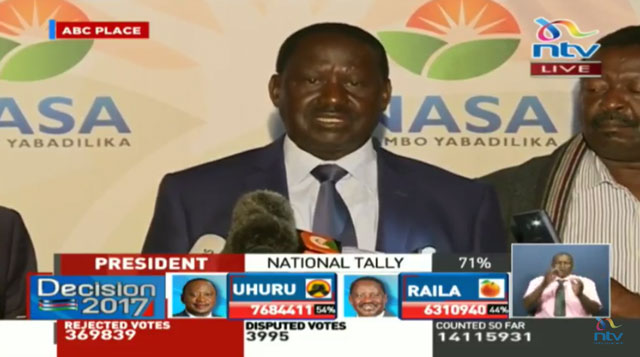
Nairobi, Kenya | AFP | Kenyan opposition leader Raila Odinga is expected to unveil his next move Wednesday to contest a presidential poll he claims was rigged in favour of President Uhuru Kenyatta.
The 72-year-old cried foul shortly after vote counting began in last Tuesday’s election, sparking deadly protests in his strongholds that left at least 17 dead and 177 injured.
The unrest quickly gave way to a tense limbo as his supporters wait to hear if their leader will take his grievances to court, as he has been urged to do, or out onto the streets.
Initially his decision had been planned Tuesday, however he pushed this back by a day citing the “complexity and delicate nature” of discussions with his allies in the National Super Alliance (NASA) coalition.
His vow that “there is no turning back”, and comments by NASA officials that court is not an option have placed the country on tenterhooks over the likelihood of a protracted vote dispute, more violence and economic disruption.
The international community and many within Kenya have urged Odinga to use legal means to express his grievances.
The veteran opposition leader has now lost four elections and cried foul over results in the previous two.
After the 2007 vote, Odinga’s supporters took to the streets, and a resulting crackdown coupled with a wave of politically motivated tribal violence left over 1,100 dead.
In 2013 he challenged the presidential results in court and lost.
Any legal challenge must be lodged by Friday.
– ‘Can of worms’ –
A legal petition can also be filed by members of civil society.
The Kenyan government’s NGO Board regulatory body has since Monday moved to shut down two rights organisations, one of which said it was mulling Supreme Court action over election “inconsistencies”.
Maina Kiai, board member of both the Kenya Human Rights Commission (KHRC) and the Africa Centre for Open Governance (AfriCOG), said the move was politically motivated.
“People who may go to court are being deregistered,” he said. “Once you close off avenues for legal, non-violent, peaceful redress, you open up a can of worms.”
Speaking this week, Kenyatta said that if Odinga chose not to go to court, he was welcome to protest legally.
“Just do it peacefully, orderly… As a government we will not allow loss of life, destruction of property and looting,” he said.
While police deny the use of excessive force, outrage is growing over brutality during the crackdown on protesters.
On Tuesday a six-month-old baby succumbed to her injuries after four days in a coma after being clubbed in a police raid on a house during protests on Friday night, her father told AFP.
Among the dead was also a nine-year-old girl hit by a stray bullet when police opened fire in a slum.
The opposition claims the electronic voting system was hacked and the results manipulated.
One of their complaints is that not all of the scanned forms meant to back up the electronic results have been provided to them.
Rights groups such as KHRC had also raised the alarm about votes being streamed electronically before back-up evidence was made available.
The dispute has plunged Kenya into its worst political crisis since the 2007 post-election violence that laid bare decades-old political and ethnic grievances over access to power and land.
Three of Kenya’s four presidents — including Kenyatta and his father — have come from the Kikuyu ethnic group. The other was Kalenjin.
That has left the Luos — Odinga prominent among them — and other major ethnic groups feeling excluded from power and marginalised for over half a century.
 The Independent Uganda: You get the Truth we Pay the Price
The Independent Uganda: You get the Truth we Pay the Price





